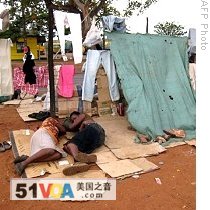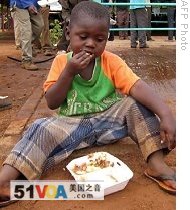Near Musina, South Africa
12 February 2009
 |
| Zimbabweans rest in there makeshift homes at show grounds in Musina, 17 Dec 2008 |
It is late afternoon and the sun glints on the razor wire of the triple fence line marking South Africa's border with Zimbabwe.
A half-dozen boys in ragged clothes scramble through a small opening in each fence showing how easy it is to cross back and forth from their country.
At night they often hide in empty vehicles or buildings at the border post in Beitbridge or sleep across the border to escape South African police.
But many migrate to a camp on a sprawling fairground in Musina, 12 kilometers up the road, which offers some food and some protection.
Seventeen-year-old Ippo Mario arrived several weeks ago. He fled to South Africa after Zimbabwe's ruling ZANU-PF party began attacking supporters of the opposition Movement for Democratic Change following disputed elections last year.
"First, they burnt down my father's shop and threw stones through the glass. And one time they beat my father. That's when I decided to run away after my father was dead and my mother also is deceased," said Mario.
 |
| A young Zimbabwean boy eats a meal at the show grounds in Musina on December 17, 2008 |
"Their needs, it's - one - to have shelter, to have a place where they can stay. Two: As an individual they need personal things like clothing, like blankets, like toiletries. And most of them they actually want to be in school," said Ramugondo.
His group has been able to place 250 children in local schools. For the others who are still waiting, they have organized informal classes with volunteer teachers who teach coping skills.
Because they are under-age, refugee children cannot apply for asylum in South Africa. So an adult aid worker goes with them to the registration center and helps them fill out the forms.
For young women, the dangers are even greater. Sixteen-year-old Riuvarasha Azangwe was crossing the border with her sister when a gang of young men, called gumagumas here, tried to rape them in the bushes.
"I fought them. So they said they want to cut me. They cut me and they ran because there were soldiers coming," said Azangwe.
Azangwe needed 20 stitches to sew up the 10-centimeter-long gash in her arm. The men took all her belongings including a cell phone with the number of a relative she was to join in Johannesburg.
A counselor with Save The Children, Lillian Rambuda, says most of the unaccompanied girls are invisible. They do not contact the aid agencies because they are quickly taken in to work on farms or in the sex trade.
"Girls, especially girls, are under a big challenge because some are starting to do prostitution while they are still young. They are being grabbed by big men lying to them, expecting them to do things which they were not willing to do. As they are stranded and vulnerable they do as they are told," said Rambuda.
The heartache of these children often comes out in music such as this song written in the Shona language by 17-year-old Tonderai Muroyiwa.
He sings "please forgive Zimbabwe. Look at the suffering, the people dying. Please help."
Humanitarian groups say the only solution for kids like this is schooling until they can get jobs. But that could take a long time since there are millions of unemployed people already in South Africa, from both sides of the border.